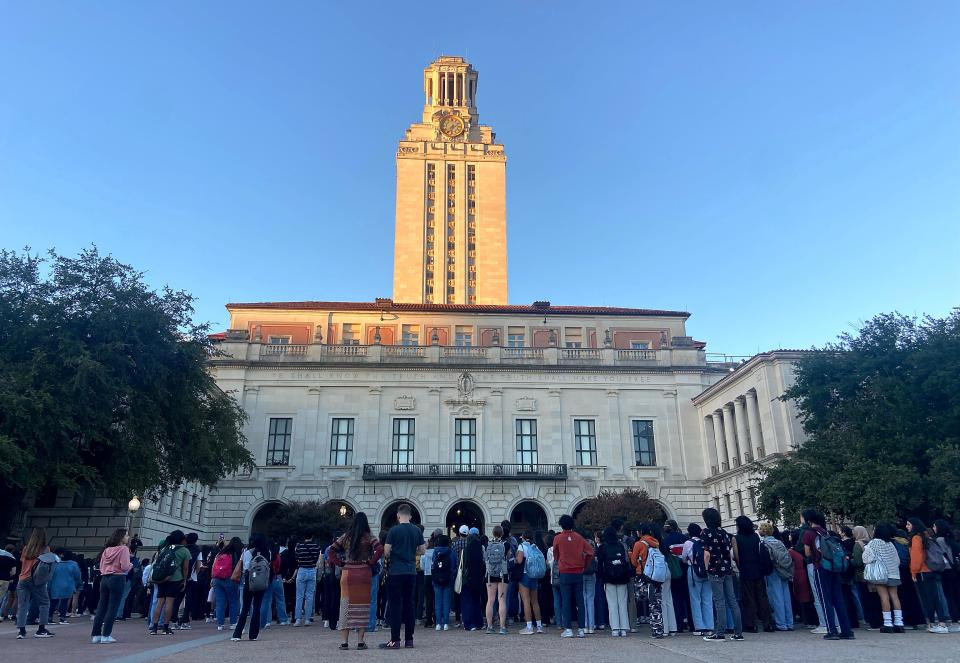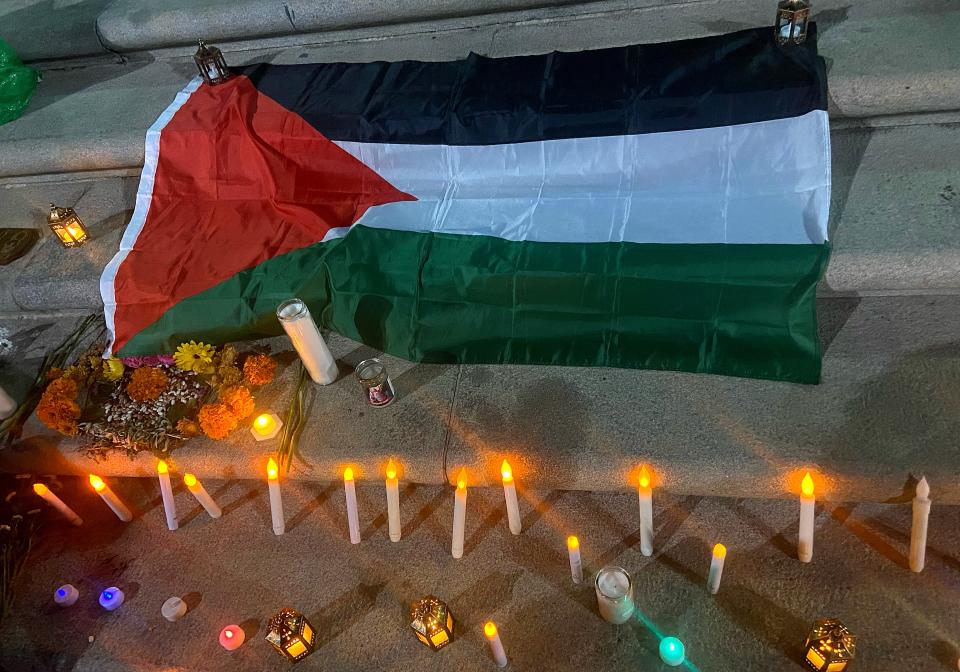UT Austin celebrates free speech. Some students say they don't feel safe discussing Gaza
At the University of Texas, free speech is upheld and celebrated. During its annual free speech week, the university hosted events with professors and national officials last week to discuss the importance of diverse perspectives, civil discourse and constructive debate.
Some students, however, say they're afraid that openly expressing their views on issues such as the ongoing Israel-Hamas war could bring them negative attention or even harm.
A day after the Al-Ahlil Baptist Hospital was bombed in the Gaza Strip, the Palestine Solidarity Committee, a UT student group, held an emergency vigil on campus Wednesday in response to the attack. More than 300 people attended, and as golden hour fell across the UT Tower Plaza, where the vigil was held, students spoke of fear and grief as they came together in mourning.
A graduate student, who asked not to be named due to safety concerns, said they attended the vigil to show solidarity with Palestine. But they did not attend without fear.

“Just one thought that I had before coming to this, I was prepared that something's going to happen. Something harmful is going to happen to us,” the student said.
Some people who attended took extra steps to conceal their identities. The vigil was peaceful and undisturbed.
Jewish UT students held a similar vigil Oct. 9 to mourn and pray two days after the conflict began when Hamas, a Palestinian militant political group, attacked Israel. More than 300 students attended that event.
Both vigils were secured by UT police.
Noy Lohr, an Israeli American student, said some students have stopped wearing the Jewish Star of David for fear of antisemitism and feel uncomfortable speaking up about the highly charged issue.
“While yes, I think that Jewish students, Israeli students on campus definitely feel a sense of support from their university, in my opinion, I don't think that students feel safe to express their genuine emotions,” Lohr said. “I know my own opinions are either not deemed important or necessary, or it just brings and invites violence and hate despite facts.”
Free speech is protected at the University of Texas
UT President Jay Hartzell said free speech is highly valued on campus, and the school's annual free speech week is a chance to celebrate and remember its importance. When it comes to safety in free speech, Hartzell said he hopes students can have ground rules and shared values.
“It hurts my heart, and we’d like to set a different tone on campus,” Hartzell told the American-Statesman in an interview Wednesday. “That’s part of why we’re celebrating free speech week. … Our hope is that in that moment when somebody feels like they have something they want to share, that they feel that they're supported in sharing.”
The university's student affairs division reached out to Jewish, Israeli and Palestinian student groups Oct. 9 to offer its support. Earlier this month, students spoke about the difficulty of coping with the war.
On Oct. 12, a student meeting at UT's Welch Hall held by the Palestine Solidarity Committee about the history of Palestine was disrupted by three men who were in the hallway outside the event and verbally harassed those in attendance. A video was posted online shortly after the incident showing a man saying he will be “in Israel killing Arabs.”
Since then, Hartzell has sent two emails to the UT community, with the first on Oct. 13 announcing that UT police have plans for keeping campus events safe. The email came after the national group Students for Justice in Palestine declared a National Day of Resistance that made some Jewish people feel threatened.

On Oct. 17, Hartzell sent another email addressing how the Middle East conflict has deeply affected both Jewish and Palestinian students on campus and condemning the acts of Hamas. Hartzell also promised that UT would be active in identifying perpetrators of hate-filled incidents against Jewish, Palestinian and Muslim communities.
“Speech is protected on our campus, violence is not,” Hartzell wrote.
In an interview filmed this week at UT, Amanda Cochran-McCall, the university's vice president for legal affairs and general counsel, said that incitement to imminent violence or lawless action, fighting words and obscenity are not protected under the law or on campus.
“[The First Amendment] trusts that the discourse that we’ll have about that is valuable,” she said. “We do live in a space of discomfort sometimes when we are a place that values free speech, and that’s just part of the price for having the benefit that it gives us.”
Hate speech is not specifically defined under the law.
UT students' views differ on safety in speech
Zander Feinstein, a junior at UT and a leader in multiple Jewish organizations on campus, said Hartzell’s email and assurances of increased security have made a difference in his perception of safety on campus.
“I feel very comfortable sharing my thoughts about Israel,” Feinstein said. “People shy away from speaking about free speech. But I think that, especially in times like this, it's important to discuss not just about Israel and Hamas, but about free speech as a whole and its part on the college campus.”
The school president's two emails addressed how the war has affected students in general but did not speak to specific incidents. A Muslim UT student, who asked not to be identified due to safety concerns, said the lack of response from the university directly and publicly about the incident at the Palestine Solidarity Committee meeting at Welch Hall was harmful.
“At what point does free speech become hate crime?” the student asked. “Because our students were targeted for being Palestinians, for being Muslims on campus.”
Students also expressed disappointment with the president's emails not explicitly mentioning Islamophobia.
Anwer Imam — an imam, or Muslim prayer leader, and director of religious affairs at Nueces Mosque, an off-campus mosque that serves downtown Austin and students from UT and other area universities — said the university had not reached out to them as of Wednesday about the incident at Welch Hall or any others in which Palestinian support student groups were harassed or felt in danger.
“That to me is a problem,” Imam said. “Definitely, there is a real, tangible concern for safety. Because when things do happen, we don't feel supported, and more so we don't feel heard.”
Imam said the mosque did received a message from Student Emergency Services and it has been in contact with Austin police.
Ayisha Rimshem, a Muslim student at UT who attended the vigil for Palestinians, said she believes in free speech on campus for both sides, but that peacefulness must be considered.
“I don't think any side should be harassed for saying what they feel or what they support,” she said.
Emma Miller, a senior at UT and a member of multiple Jewish organizations on campus, said she worries that polarization prevents understanding on campus.
“There are people out there on both sides that are so extreme, but for the most part, everyone is just in support of everyone's safety,” she said.
Why free speech?
Mira Kovalsky, a UT senior and a member of multiple Jewish organizations on campus, is Israeli American. She said her grandfather’s family escaped from a concentration camp during the Holocaust, and that adds to her sense of duty to speak out, even when it feels exhausting.
“When nobody spoke up during the Holocaust, that's the whole reason that so many people were murdered,” she said. “I need to use my voice, and I need to take advantage of the fact that I have free speech.”
Yusrallah Adediran, a first-year student at UT and a member of the Muslim Student Association and the Black Muslim Alliance, said she attended the vigil because she believes it’s important to show support.
“I feel like it's important to show up,” Adediran said. “Whether you're Muslim, non-Muslim, Arab, non-Arab, I feel like they said it's a humanity thing.”
University officials said the school's student affairs group has sent information to student leaders on campus about how to lead and support their peers. In Hartzell’s Oct.17 email, he said the university will work with the faculty to further invest in research and teaching that helps students understand the conflict.
Brian Pena, a UT junior and the president of University Democrats, said the political club is very involved in Austin-centric politics and voter registration. Pena said he feels that the club “has every ability” to speak freely.
Jackson Paul, a UT senior and co-chairman of the university's chapter of Young Conservatives of Texas, said he has been met with respect and understanding in conversations on campus.
“On the whole, free speech at UT is thriving and I think growing stronger and stronger,” Paul said.
Brendon Bankey, UT debate director and associate professor of instruction, led a debate with the UT debate team Tuesday, as part of free speech week, on whether universities should allow all forms of constitutionally protected speech.
“A lot of the arguments were traded back and forth in terms of the potential harms if universities begin to regulate constitutionally protected speech,” he said, “and how that can kind of backfire.”
Jet Sullivan, a UT student, won the Moody College competition for his video about free speech. In his view, “free speech is what makes us people.” At UT, he said, it is absolutely a part of campus culture.
“I hear all sorts of different opinions, for the left, for the right, different religious backgrounds, different cultural backgrounds. I hear it all the time,” Sullivan said. “Everyone is always so supportive of each other. And I think that's such a fantastic thing.”
This article originally appeared on Aberdeen News: Amid Israel-Hamas war, UT Austin students reflect on free speech

